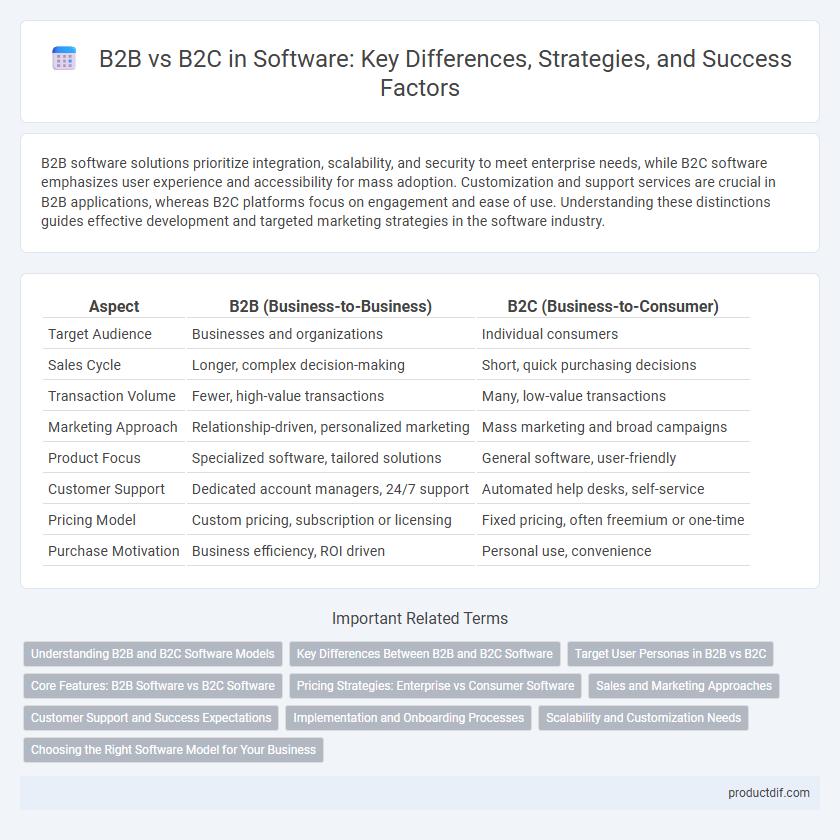B2B software solutions prioritize integration, scalability, and security to meet enterprise needs, while B2C software emphasizes user experience and accessibility for mass adoption. Customization and support services are crucial in B2B applications, whereas B2C platforms focus on engagement and ease of use. Understanding these distinctions guides effective development and targeted marketing strategies in the software industry.
Table of Comparison
| Aspect | B2B (Business-to-Business) | B2C (Business-to-Consumer) |
|---|---|---|
| Target Audience | Businesses and organizations | Individual consumers |
| Sales Cycle | Longer, complex decision-making | Short, quick purchasing decisions |
| Transaction Volume | Fewer, high-value transactions | Many, low-value transactions |
| Marketing Approach | Relationship-driven, personalized marketing | Mass marketing and broad campaigns |
| Product Focus | Specialized software, tailored solutions | General software, user-friendly |
| Customer Support | Dedicated account managers, 24/7 support | Automated help desks, self-service |
| Pricing Model | Custom pricing, subscription or licensing | Fixed pricing, often freemium or one-time |
| Purchase Motivation | Business efficiency, ROI driven | Personal use, convenience |
Understanding B2B and B2C Software Models
B2B software models prioritize scalability, integration capabilities, and custom workflows to meet complex organizational needs, often featuring advanced security protocols and multi-user access. B2C software focuses on user-friendly interfaces, personalization, and quick onboarding to maximize engagement and retention among individual consumers. Understanding these distinctions helps developers tailor product features, pricing strategies, and support services to effectively serve business clients versus individual users.
Key Differences Between B2B and B2C Software
B2B software primarily focuses on streamlining complex business processes, offering features like multi-user accounts, advanced security, and integration with existing enterprise systems, while B2C software emphasizes user-friendly interfaces and scalability to handle large consumer bases. B2B solutions typically involve longer sales cycles, higher prices, and customization options tailored to specific business needs, contrasting with the mass-market approach and standardized functionalities found in B2C software. Data security, compliance standards, and robust customer support are critical differentiators for B2B software compared to the more flexible, experience-driven design priorities in B2C applications.
Target User Personas in B2B vs B2C
B2B software targets decision-makers such as executives, procurement managers, and IT professionals seeking tools that improve operational efficiency and ROI. B2C software focuses on individual consumers prioritizing user experience, ease of use, and personalized features that drive engagement and satisfaction. Understanding these distinct user personas enables tailored product development, marketing strategies, and customer support for optimal adoption and retention.
Core Features: B2B Software vs B2C Software
B2B software emphasizes advanced integration capabilities, robust security protocols, and customizable workflow automation tailored for enterprise-level operations. B2C software prioritizes user-friendly interfaces, scalability, and personalized user experience features to accommodate diverse consumer behavior and preferences. Both models require data analytics, but B2B focuses on detailed reporting for business insights, while B2C emphasizes real-time customer engagement metrics.
Pricing Strategies: Enterprise vs Consumer Software
Enterprise software pricing strategies often involve subscription-based models, volume licensing, and customized pricing tiers tailored to specific organizational needs, while consumer software typically relies on fixed pricing, freemium models, or one-time purchases to attract individual users. B2B pricing emphasizes long-term contracts and value-driven packages that support scalability and integration capabilities, contrasting sharply with B2C approaches that prioritize simplicity, affordability, and user experience. Understanding these differences enables software companies to optimize revenue streams and target market segments effectively.
Sales and Marketing Approaches
B2B software sales rely heavily on relationship-driven marketing, emphasizing personalized outreach, detailed product demonstrations, and longer sales cycles tailored to business needs. B2C software marketing focuses on broad reach strategies, leveraging social media, user-friendly interfaces, and impulse buying behaviors to drive rapid adoption. Data analytics and customer feedback play crucial roles in optimizing both B2B and B2C sales funnels for increased conversion rates.
Customer Support and Success Expectations
B2B software customers prioritize personalized, high-touch support with dedicated account managers and proactive success strategies to ensure seamless integration and long-term ROI. In contrast, B2C software users expect fast, automated assistance through self-service portals, chatbots, and responsive help desks to resolve issues instantly. Effective customer support and success in B2B hinge on relationship management and tailored solutions, whereas B2C emphasizes accessibility and speed.
Implementation and Onboarding Processes
B2B software implementation typically involves complex integration with existing systems, requiring tailored onboarding that includes extensive training and support for multiple user roles. B2C onboarding emphasizes user-friendly interfaces and quick setup to enhance customer experience and accelerate adoption. Leveraging automated guides, tutorials, and in-app assistance streamlines processes in both B2B and B2C environments, but B2B demands deeper customization and ongoing technical support.
Scalability and Customization Needs
B2B software solutions demand higher scalability to support multiple users and complex workflows across enterprises, while B2C platforms prioritize performance under high user volumes but with standardized features. Customization in B2B systems is critical for aligning with unique business processes and integrating with existing enterprise infrastructure, contrasting with B2C software that favors broad usability and minimal configuration. Scalability for B2B involves modular architectures and robust APIs, whereas B2C scalability emphasizes load balancing and rapid feature deployment.
Choosing the Right Software Model for Your Business
Selecting the appropriate software model hinges on understanding whether your business operates in a B2B or B2C environment, as each demands distinct features and scalability options. B2B software typically emphasizes integration, security, and customization to meet complex workflows, whereas B2C solutions prioritize user experience, accessibility, and high transaction volumes. Analyzing customer interaction patterns and long-term business goals ensures the software aligns with operational needs and maximizes return on investment.
B2B vs B2C Infographic

 productdif.com
productdif.com